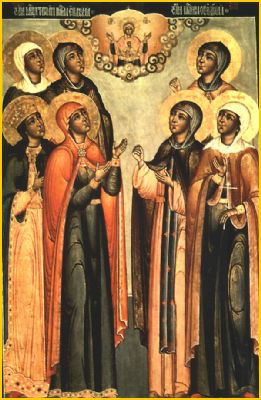|
|||
|---|---|---|---|
| This weekly bulletin insert complements the curriculum published by the Department of Christian Education of the Orthodox Church in America. This and many other Christian Education resources are available at http://dce.oca.org. | |||

Saint Eudokia of Heliopolis lived a dissolute life for many years. She was converted to Christianity when she heard the chanting of a monastic elder coming from a gathering of believers in a neighbor's house. Eudokia received instruction, entered a monastery, and practiced strict repentance. Her life as a nun became so pure that she received the gifts of healing and of raising the dead. Like many saints with great gifts, Eudokia was persecuted by people who were afraid both of her and of the mighty God who could bestow such gifts. Despite her good works, she was falsely accused of stealing money and hiding it in the monastery. Her life ended with execution at the hands of a pagan governor who feared her and the God she so effectively served. In our day, fear of God's influence continues to make people rewrite history, or at least try to. One example is the movie "The Last Station," an account of the final years of the Russian novelist Leo Tolstoy and his wife Sophia. Tolstoy had abandoned the Orthodox Church, and had begun a way of life based on Christ's moral teachings but devoid of ritual, sacraments or belief in miracles. He had thousands of followers, the "Tolstoyans," who lived simply, eschewed wealth, and hung on his every word. Sophia, mother to his nine children, understandably opposed Tolstoy's plan to give away his money, and there were screaming arguments. The movie shows the arguments, but fails to show that Sophia understood her husband as his closest followers never could. Karl Stern writes in his book "The Flight from Woman" that she saw Tolstoy as a poet. It distressed her when, after his "conversion" to his new faith, his writing became heavily moralizing and puritanical. She rejoiced when he told her he planned to write a narrative piece once again, and she told him, "This is the kind of work for which you were created. Without it there can never be any real peace for your soul." Ill at the age of 82, Tolstoy left Sophia in the middle of the night, making his way to the Shamardino Monastery where his sister was a nun. He planned to stay at least a few weeks, but after one day his daughter and a Tolstoyan fiercely opposed to Sophia convinced him to move on, to avoid his wife finding him. They reached a remote train station, to which Sophia did follow them. Despite her frantic pleas they kept her from him, though the movie shows a deathbed visit.
The Church was also kept away. A priest urgently asking to offer Holy Communion was never allowed to see Tolstoy. The movie inexplicably shows only a sleeping, apparently indifferent priest whom Sophia rushes past as she goes to her husband. The people around Tolstoy were afraid of the Church. The people around Saint Eudokia were afraid of God. The people who made "The Last Station" were willing to rewrite history so as to shut out both. |
|||
